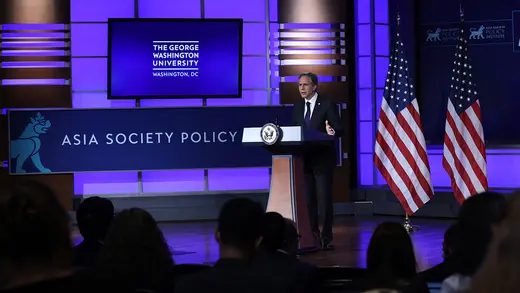In Brief
Biden’s Grand China Strategy: Eloquent but Inadequate
The Biden administration’s freshly announced China strategy offers a welcome change in tone but few new policies.
U.S. Secretary of State Antony Blinken’s speech on Thursday outlining the Joe Biden administration’s China strategy was eloquent, logical, and gave Biden’s oft-criticized China policy some much-needed coherence. But it was also a year late and neglected many major issues facing the two countries.
Great Expectations
Blinken’s talk was billed as an explanation of the administration’s grand strategy toward China. The Donald Trump administration essentially tore up decades of largely bipartisan consensus on China, seeing the need to confront China on a range of issues—and to do so largely alone.
More on:
After taking office, Biden was expected to unveil a new policy toward his chief foreign challenge. Instead, 2021 passed with the new administration pursuing many of the same policies as its predecessor. It kept in place tariffs meant to punish China for unfair trading practices, and it did not try to revive the person-to-person and academic programs that the Trump administration killed.
These choices mirrored a growing consensus in Washington to get tough on China. But they also reflected clear divisions in the administration over China policy and confusion over how to handle critical issues, such as Taiwan.
Investing at Home + Aligning With Allies = Competing With China
Blinken’s speech went some way toward unifying the administration’s policies. Called “invest, align, compete,” the strategy is in some ways a restatement of Blinken’s March 2021 speech, when he said U.S. policy toward China will be “competitive when it should be, collaborative when it can be, and adversarial when it must be.”
In its more developed iteration, the policy focuses mainly on non-China actors. The first is “invest”, which calls for the United States to invest more in high tech and other future-oriented industries so it can compete with China. However, Washington’s political paralysis is leaving new investment packages dead for the foreseeable future, barring a Democratic victory in the upcoming midterm elections.
The second (“align”) is about finding allies who oppose China’s vision of authoritarian-based development. Here, Blinken stood on much firmer ground. He outlined steps the administration has taken to link up countries with shared interests. This includes the newly announced Indo-Pacific Economic Framework, the Australia-UK-U.S. (AUKUS) military cooperation scheme, and expanded collaboration through the Quad.
More on:
The third pillar (“compete”) unites the first two to challenge China. The goal, he emphasized, is not to isolate or harm China, but to uphold the rules-based international order that led to China’s rise. Another goal is to offer developing countries alternatives to China’s Belt and Road Initiative.
Little Scope for Cooperation
Blinken listed areas where the United States and China could cooperate, but they were largely familiar issues that have gotten little real traction. They include climate change, COVID-19, nuclear proliferation, synthetic drugs, and the emerging global food crisis.
Even more telling was the lack of discussion on tariffs. Some officials, such as U.S. Trade Representative Katherine Tai, favor keeping tariffs on Chinese goods in place, while others, such as Treasury Secretary Janet Yellen, have come out against them.
Instead, Blinken served up relatively well-worn calls for U.S. businesses to enjoy the same rights in China as Chinese businesses do in the United States. This is a refrain that administrations have made for decades to no avail. Blinken’s citation of social media and traditional media—two areas where China will never allow unfettered access—makes it even less plausible that the administration has any specific plan in mind.
Unconvincing Assurances
Chinese officials did not seem to be Blinken’s target audience. He gave assurances that the United States does not seek to change China’s system of government, adding, “We are not looking for conflict or a new Cold War. To the contrary, we’re determined to avoid both. We don’t seek to block China from its role as a major power.” These are a departure from the Trump administration’s rhetoric, which directly agitated against China’s system of government.
But Beijing is unlikely to find Blinken’s assurances convincing, because he started off his speech by saying China is “the most serious long-term challenge to the international order.” He added, “China is the only country with both the intent to reshape the international order and, increasingly, the economic, diplomatic, military, and technological power to do it.”
Moreover, Blinken repeated that the U.S. position on Taiwan has not changed, despite Biden saying days earlier that the United States is bound to come to Taiwan’s defense. That flip-flopping makes it unclear whether Beijing will take anything away from this point other than that the United States is playing games, or that Biden is muddleheaded.
Choosing the United States Over China?
Blinken seemed more interested in addressing foreign governments, repeating on several occasions that allies will be unified. But he said that other countries needn’t choose: China has its own system, and countries are free to choose the authoritarian model, if they want to emulate that, or more democratic models.
“We don’t expect every country to have the exact same assessment of China as we do,” Blinken said. “We know that many countries, including the United States, have vital economic or people-to-people ties with China that they want to preserve. This is not about forcing countries to choose.”
That, more than anything else, is perhaps the most interesting outcome of the speech. If other countries feel that the United States is indeed playing the role of an honest broker and offering options rather than patented prescriptions, then the Biden administration could pull countries back from falling inexorably into China’s orbit.
Kathy Huang contributed to this In Brief.
 Online Store
Online Store

